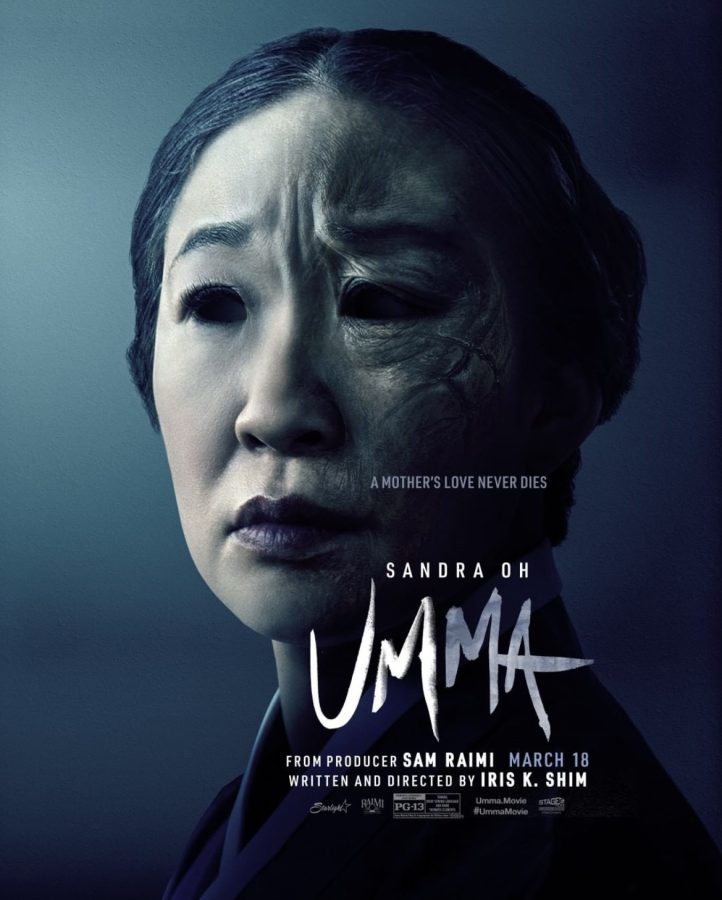*CW: Implications of child abuse*
*WARNING: MOM-DERATE SPOILERS*
“Either a mother and daughter know each other very well or they are strangers.” -Shin Kyungsook, “Please Look After Mom”
Amanda (Sandra Oh) thought she could run from the guilt, the pain and the mother (MeeWha Alana Lee) who knew her as Soohyun. When her mom’s ashes are brought to her to fulfill her ancestral rites, Amanda realizes that she’s still Mommy’s little girl, and her own daughter (Fivel Stewart) could be next.
“Umma” (or Korean for mom) sounds like a project primed for greatness; a horror genre take on generational trauma (particularly, its effects on Asian American mothers and daughters) produced by none other than Sam Raimi. It should have and could have worked, but the film’s biggest scare is that the premise (or rather, the promise of it) can’t save it entirely.
If you’ve watched the trailer and are looking for slow burn terror, congratulations, you’ve seen the best scares in the entire film. The script’s flow is hampered by jarring exposition dumps and characters will verbally shift into the next phase of the story with all of the subtlety of a jackhammer. Plot points are thrown in only to never fully materialize; there’s an appearance of a gumiho (or nine-tailed fox spirit) that could’ve possibly led to something, but it’s just…there. It’s unclear whether “Umma” would have benefited from a longer running time, but the whole affair felt too abbreviated; like horror a lá Cliff Notes.
That’s not to say that the film totally misses the mark. Sandra Oh turns in a brilliantly chilling performance as Amanda, a woman reenacting her past trauma even as she attempts to rewrite it. It’s a timely reminder that audiences deserve to see Oh in more leading roles; if this, “Killing Eve” and “Turning Red” are any indication, the “RenOhsance” has yet to reach its peak.
One may be tempted to compare “Umma” to Ari Aster’s “Hereditary” which, while the two films may be similar, feels like an unfair comparison. Both films are haunted in a variety of ways by the specter of an overbearing matriarch, but “Umma” speaks to a very specific, yet universal, concept.
In an interview with feminist horror podcast “The Final Girls,” director Iris K. Shim spoke of the concept of “unresolved ghosts” within Korean culture and how they represent the things/emotions that people hide away in order to persevere and provide for their families. In Amanda‘s mom‘s case, her hidden sacrifices and feelings of isolation manifest in her intense dependence and fury toward her own daughter. Amanda on the other hand, hides her culture from her daughter out of shame and the fear of possibly turning into her mom – a fear that the film makes literal. What it lacks in tension, atmosphere and nuance, it makes up for with a strong understanding of its characters and its willingness to at least tackle the emotional toll of cultural assimilation.
Perhaps more people would’ve been able to witness this perspective, had “Umma” received a better promotion from Sony; the studio didn’t roll out an official trailer OR poster for it until March 1 when the movie was due out on March 18. Had it not been for the tweets of author/sociologist Nancy Wang Yuen, this review may never have been written. While “Umma” is far from flawless film, it doesn’t serve as a monolith for all Asian American horror. At the end of the day, it’s still a welcome presence and hopefully this will serve as a step towards even more diverse narratives in mainstream Hollywood genre films.
4/10
Alternatives: watch Remi Weekes’ “His House” (on Netflix), read Shin Kyungsook’s “Please Look After Mom,” watch Bong Joonho’s “Mother”










